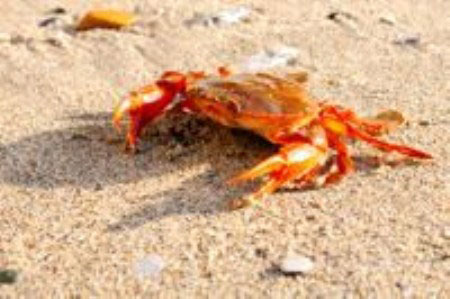Invasion of poison crabs into the North Sea
A new study shows that climate change has caused a population of poisonous Henslow crabs to leave their homeland and invade the North Sea of Europe, causing a major change in marine ecosystems.
These exotic crabs swim from warm Portuguese waters to the waters of eastern England. Experts discovered this when studying the increase of crustacean larvae in the North Sea. These are very small larvae of shrimp and crab. The temperature of the North Sea increased by one degree C over the past three decades. That makes crabs swim here more and more.
Crab is a very agile predator. Unlike other cousins that live only around the coast where they grow up, the crabs that are larger and flatter in the front are useful, used to swim on the surface of the sea. flock for a very large number.
Research on the strange behavior of swimming crabs Henslow when appearing in the North Sea was published in Biology Letters of the Royal Society. The lead researcher, Dr. Richard Kirby of Plymouth University (UK), collaborated with Dr. Alistair Lindley of the University of the Great Sciences and those at the Wimereux Marine Station (France).
Crabs and shrimp are important predators, from larvae to adults. They affect the diversity of other animals such as shellfish and flatfish. Henslow swimming crabs will become an extremely important new carnivore in the small marine fauna in the North Sea.

Henslow crab image.
According to experts, the increase in the number of individuals of this crab species could greatly affect the food network in the North Sea. They argue that the emergence of new crabs and shrimp explains the impact of climate change on the amount of food in the sea, which in turn will lead to a sudden change in the North Sea ecosystem.
Dr. Kirby said: 'Currently, the North Sea is one degree C hotter than 30 years ago. This means that the number of crab and shrimp larvae in plankton and adults in the sea has increased. Henslow swimming crabs are very unusual, with offshore characteristics as adults. This makes it possible to conquer the warm waters of the North Sea when leaving the Atlantic home. '
In the south of the North Sea, the proportion of shrimp and crabs compared to two-piece creatures such as shellfish and snails . has doubled since the 1980s. More importantly, we see the change. same for adults on the seabed.
Scientists believe that changes in the system of crustaceans in the North Sea may play an important role in propagating the effects of climate change, in particular on ecosystems. of the North Sea. The impact of the appearance of jellyfish in the system of plankton, crustaceans, sea urchins, surpassed commercial fishing grounds.
The predictions of global climate change show that the seas around us will continue to warm up. This means that we will see even more warm water animals that will be able to change the North Sea ecosystem even more.
Source: Physorg
- Giant sea crabs 'invaded' Europe
- Top of unprecedented species of crabs
- Giant sea crabs with fishermen nets
- How to eat crabs?
- Catching super rare purple crabs caused a stir
- Video: Hold 1,000 crabs in the palm of your hand
- Giant crabs weigh up to 4kg
- How to choose crabs, delicious and meaty crabs
- Australia: Red crabs are in danger because of oil spills
- Chinese netizens voluntarily eat less invasive crabs to save the US ecosystem
- Who should not eat crabs or crabs?
- Giant sea crab long by car
 Surprised: Fish that live in the dark ocean still see colors
Surprised: Fish that live in the dark ocean still see colors Japan suddenly caught the creature that caused the earthquake in the legend
Japan suddenly caught the creature that caused the earthquake in the legend A series of gray whale carcasses washed ashore on California's coast
A series of gray whale carcasses washed ashore on California's coast Compare the size of shark species in the world
Compare the size of shark species in the world